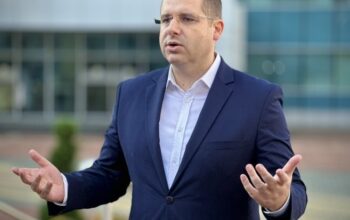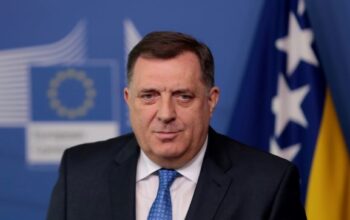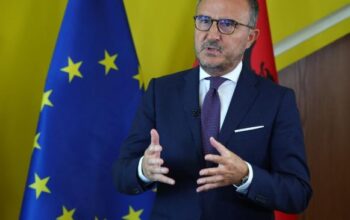The EU Delegation to BiH posted an op-ed by the Head of the EU Delegation and EU Special Representative in BiH, Johann Sattler and the Charge d’affaires of the Diplomatic Office of Belgium in BiH, Benjamin Sturtewagen. Its full text is below.
The EU’s founders were a colourful and fascinating group of people. Jean Monnet, the great pioneer of European integration, was a charismatic Cognac merchant before becoming involved in politics. Altiero Spinelli, while in prison in 1941, wrote a landmark manifesto for European unity on cigarette papers, and had it smuggled out of jail in a roast chicken. Robert Schuman, the author of the ‘Schuman Declaration’ of 9 May 1950 that paved the way to today’s European Union, was a deeply religious man who has been beatified by the Catholic Church, one of the steps towards sainthood. Konrad Adenauer, the workaholic postwar German Chancellor, was a pioneer of reconciliation that restored his country’s reputation and economy following the devastation brought on by Nazism. Simone Veil, the President of the first directly elected European Parliament in 1979, survived Auschwitz and Belsen.
Despite their diverse personalities, nationalities, political party affiliations and life stories, the EU’s founders were united by a belief that Europe must no longer be devastated by the wars that were such a constant feature of our history. United in the view that the memorials to lives cut short located across our continent must be a powerful and constant reminder of what is at stake. United by the idea that the numerous peoples of Europe have their national identities strengthened by working together, and that a flag should be a source of celebration and pride at a football match or a cultural festival, rather than attached to a bayonet or a tank. For the citizens of Bosnia and Herzegovina, who have endured the scars of conflict in living memory, the promise of a future within the EU represents a guarantee of peace, security and a better future.
Enlargement is one of the EU’s most successful policies. Indeed, bringing 450 million people together to form a Union of 27 member states is one of the reasons that the EU was awarded the Nobel Peace Prize in 2012. Nonetheless, the project of uniting the nations of Europe is incomplete.
There is now a new dynamism in the process of enlargement, a realisation that countries that wish to join the EU cannot remain in the waiting room forever. This realisation has been brought into sharper focus by Russia’s illegal war of aggression in Ukraine, which seeks to redraw borders and return Europe to a ‘might makes right’ way of doing politics – the very thing the EU was founded to consign to history. There is an understanding that if countries in the Western Balkans sincerely engage with reforms, the path to the EU should be re-energised, and the region should be offered new opportunities for greater integration with the European Single Market, as well as new sources of funding.
Before the European Council’s historic decision to open accession negotiations with Bosnia and Herzegovina, the state level coalition demonstrated a desire to sincerely engage with the reforms necessary to make progress on the EU path. Through negotiation, dialogue and compromise – which are so important in the EU itself – a number of key pieces of legislation were adopted.
Regrettably, Bosnia and Herzegovina once again finds itself in a political crisis. For the benefit of Bosnia and Herzegovina’s citizens, leaders need to demonstrate vision and true courage and leadership and take advantage of the current historic moment to make lasting progress on the EU path. EU accession requires difficult choices. It is time to start making them.
It is time to build on the spirit demonstrated by BiH’s authorities in the period before the European Council’s decision. The consensus necessary to come to common decisions that benefit all is a central feature of the EU’s way of working, and can be Bosnia and Herzegovina’s too. The 27 member states of the EU don’t always start off agreeing – indeed, for this reason meetings of EU member state leaders have been known to go on for many days, and into the early hours of the morning. This thorough process of negotiation to reach common positions however delivers results – including a single currency, a prosperous Single Market, a Schengen zone without borders, high social, environmental and consumer standards etc.
Bosnia and Herzegovina already benefits greatly from its partnership with the EU, including improved infrastructure, trade and business ties. Programmes such as Erasmus+, Creative Europe and Horizon Europe provide opportunities for BiH students, creatives and researchers. The successful pan-European response to the Covid pandemic contributed lifesaving equipment to Bosnia and Herzegovina, over half of this country’s vaccines and over €70 million to support socio-economic recovery.
There is interest on both sides to make progress on enlargement, but this does not mean that the conditions for membership can change. They are requirements to be a successful member. The process of accession is hard work, but will deliver reforms that will lead to more functional institutions, strengthen the rule of law, improve the fight against corruption, support energy transition, lead to greater environmental protection and generate a more favourable business environment for growth and jobs, and much more. Indeed, every country that has opened accession negotiations has seen accompanying benefits in terms of investment and growth.
The EU is also committed to exploring ways that the countries of the Western Balkans can enjoy important benefits of being in the EU before full membership. Agreements on roaming already mean that BiH citizens are able to travel in the region and in Europe without racking up excessive phone bills. Plans for Bosnia and Herzegovina to join the Single Euro Payments Area (SEPA) – which is a payment integration initiative of the European Union for simplifying bank transfers – will lead to dramatic reductions in the cost of sending money to and from the EU to Bosnia and Herzegovina, with all that will mean for families and businesses. We are looking at ways to streamline procedures at border crossings and speed up the flow of traffic, including goods. We are committed to supporting further improvements to infrastructure, including to complete Corridor 5c, as well as digital infrastructure such as improved internet speeds and connections.
It is time to complete the European Union. Robert Schuman, that shy, academic Bible scholar, said in his Schuman Declaration on 9 May 1950 that “Europe will not be made all at once, or according to a single plan. It will be built through concrete achievements which first create a de facto solidarity”. On Europe Day 2024, a day when we also commemorate the defeat of fascism, we must remember the enormous achievement of a united Europe, and work tirelessly to ensure that the vision of the EU’s founders is completed here in Bosnia and Herzegovina, as across the continent.


